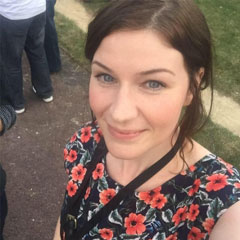Jenn Chubb, Lecturer in Sociology, Department of Sociology
Jenn is an interdisciplinary researcher focusing on the role of responsibility in science and the interplay between science and society. Her background is in Philosophy (University of Leeds) and in Social Science (University of York).

She completed a PhD at York in 2017 and rejoined the University in 2019, taking up a lectureship in Sociology at the beginning of 2023.
email: jennifer.chubb
Our 60-second interview with Jenn:
What do you do in the field of mental health?
My work concerns the societal and ethical implications of science and technology. Particularly the role of Artificial Intelligence (AI) algorithms. As AI becomes more prevalent in our everyday lives, the legal and ethical issues that confront society such as privacy and surveillance, bias or discrimination, must be considered. The ethical implications relate not only to society as a group but to individuals. The risk of harm to mental health for instance, from social media algorithms, is well documented, though still in desperate need of regulation, greater transparency and security. One aspect of my work which investigates this includes research into the implications of algorithmic 'triggers' faced by those suffering from grief or loss following baby loss. In the case of miscarriage/ baby loss, these triggers are particularly pronounced, where AI may remind and 'haunt' users attempting to protect their mental health. My work seeks not only to develop new ways of protecting better mental health outcomes for families but also to understand the harms we face as a result of living in a digital society.
What do you find most rewarding and inspiring in this work?
The most rewarding aspect of my work is in collaborating with charities and partners who can implement real change in the communities we seek to serve. In the case of miscarriage, working with Tommy's - the UK's baby loss charity, we can support women and families through tech development and reflection which will reduce stress and anxiety after a life altering event.
What is the most challenging or complicated aspect of this work?
The most challenging or complicated aspect is that one person's trigger may not be another's. We have to consult regularly with the literature on miscarriage and mental health, which has gained traction in recent years but has suffered from being overlooked. Recent reviews of mental outcomes tell us that this is a far greater threat to mental health than many realise over half of the population. Challenging stigma and taboo around miscarriage can break down barriers but we have some way to go. So too, this work relies on social media and technology companies buying into our ideas and recognising the implications their technology has. Innovators may see the work of ethics as slowing down innovation, when we just want to make it safer.
What impact do you hope your work is having- or can potentially have?
The impact is on families and women themselves, hopefully in the future, social media companies and apps will be safer for those who suffer these kinds of losses. Providing them with more agency when online.
Could you share with us one piece of advice that you follow for your own mental health?
Advocate as much as you can for yourself, speak when you feel you can about your mental health - it will make others feel less alone. Know it's OK not to be OK and that whilst it may not feel it, it is temporary. Be your own best friend.